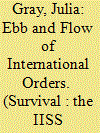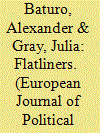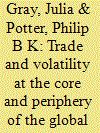|
|
|
Sort Order |
|
|
|
Items / Page
|
|
|
|
|
|
|
| Srl | Item |
| 1 |
ID:
173135


|
|
|
|
|
| Summary/Abstract |
How do countries settle disputes in the shadow of the law? Even in the presence of legalized dispute settlement, countries still rely on diplomatic channels to resolve conflicts. But it can be difficult to assess diplomacy’s impact on dispute resolution because those channels tend to be opaque. We present both an original theory of the impact of diplomacy on dispute resolution and a novel measure of diplomacy. If countries with close or, conversely, distant relationships use legal channels for dispute resolution, diplomacy will have little impact on dispute settlement; resorting to legal recourse among friends or adversaries likely means that the dispute is intractable. However, diplomacy can increase the chances of settlement between countries with moderate levels of affinity. We test this argument using a protocol-based proxy for diplomatic interactions—gifts given at the occasion of meetings between diplomatic counterparts—that would otherwise be difficult to observe. Using the case of the United States and its disputes in the World Trade Organization, we find support for our argument. This suggests that even when countries resort to legalized methods of dispute settlement, bilateral dealmaking still plays an important role.
|
|
|
|
|
|
|
|
|
|
|
|
|
|
|
|
| 2 |
ID:
164541


|
|
|
|
|
| Summary/Abstract |
For every successful international organisation, many others died out or never got off the ground.
|
|
|
|
|
|
|
|
|
|
|
|
|
|
|
|
| 3 |
ID:
086756


|
|
|
|
|
| Publication |
2009.
|
| Summary/Abstract |
What factors explain the wave of adoption of the flat tax in Eastern Europe? It is argued in this article that, once the first few successes were underway, governments with liberal outlooks toward taxation adopted the reform through a process of rational learning: an often radically new government will tend to adopt the policy based on successful implementation of its neighbours. The issue of policy diffusion is approached by explicitly modeling the different mechanisms that might underlie the process. Little evidence is found for pure 'bandwagoning' in the adoption of the flat tax - the presence of other market-minded reforms do not predict adoption of the flat tax, and contagion measures do not capture the dynamics of the adoption of the reform. Instead, rational learning, where economically right-wing governments evaluated the success of the reform (as measured by their ability to attract foreign investment) in the medium term, plays the largest role. Rational emulation in a shorter time period contributes to the probability of adoption as well, as does a change to an economically liberal ideology.
|
|
|
|
|
|
|
|
|
|
|
|
|
|
|
|
| 4 |
ID:
158680


|
|
|
|
|
| Summary/Abstract |
International-relations scholars tend to focus on the formation, design, and effects of international organizations (IOs). However, the vitality of IOs varies tremendously. I argue that IOs end up in one of three situations. They could die off altogether, though this happens infrequently. More commonly, many IOs become “zombies.” They continue to operate, but without any progress toward their mandates. A third category includes IOs that are alive and functioning. I develop a theory to explain an organization's vitality, hinging on the quality of the bureaucracy. In an environment where IOs with similar goals, and with many overlapping members, compete for bureaucrats, the ability of the secretariats to attract talented staff and to enact policy autonomously are associated with whether organizations truly stay active, simply endure, or die off. I demonstrate this proposition using a new measure of the vitality of international economic organizations from 1950 to the present. Around 52 percent of the organizations in the sample are alive and functioning, around 10 percent are essentially dead, and nearly 38 percent are zombies. Using these original data, tests of these propositions support the theory.
|
|
|
|
|
|
|
|
|
|
|
|
|
|
|
|
| 5 |
ID:
118179


|
|
|
|
|
| Publication |
2012.
|
| Summary/Abstract |
Researchers typically assume that economic openness increases volatility. But the conventional empirical shorthand for economic openness (trade as a share of overall income) fails to account for crucial distinctions in the way that states trade. States that are deeply incorporated into the core of the international trading network have very different experiences than states at the periphery with fewer, more marginalized trading partners. This article demonstrates that a position at the core of the international trading system rather than the periphery actually diminishes volatility. Thus, a country's position in the world economy can, independently of its overall volume of trade, moderate the risks of exposure to international markets. To demonstrate how this distinction might impact political outcomes and future scholarship, we show that this reduction in volatility allows governments to minimize compensation to their domestic publics.
|
|
|
|
|
|
|
|
|
|
|
|
|
|
|
|
|
|
|
|
|